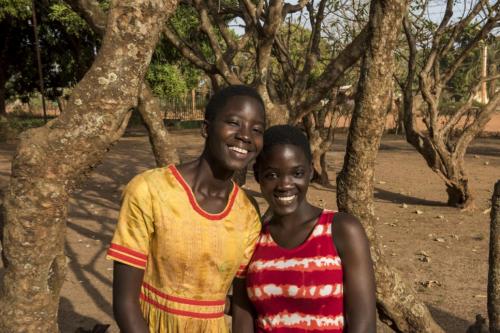Five years since Abidjan Declaration, West Africa leads on reduction of statelessness in Africa
Five years since the adoption of the Abidjan Declaration on the Eradication of Statelessness by the Economic Community of West African States (ECOWAS), UNHCR, the UN Refugee Agency is lauding progress and urging a redoubling of efforts. This is to ensure everyone in the region has a nationality and benefits from the rights of citizenship.

After growing up with no official nationality in an orphanage, now Françoise (left) and Christel are proud citizens of Cote d’Ivoire.
Since the Declaration’s adoption in February 2015, by all Member States of ECOWAS, 12 of its 15 states have now ratified both UN Statelessness Conventions. Nine ECOWAS states have put in place National Action Plans to resolve and prevent statelessness.
Birth registration campaigns have taken place in four countries, Mali, Niger, Burkina Faso and Côte d’Ivoire, with support from UNHCR and its partners. In Côte d’Ivoire, birth registration of school age children has benefitted an additional 400,000 children, reducing their risk of statelessness and helping ensure their access to education.
Sierra Leone has removed gender discrimination from its nationality laws which prevented mothers from passing nationality to their children on an equal basis as men. Liberia has pledged to do the same this year.
“We are seeing significant progress in terms of both policy and legal reform to address statelessness across the region. This is an exceptional demonstration of political will and commitment,” said UNHCR’s Regional Bureau Director for West and Central Africa, Millicent Mutuli.
“At a time when parts of the region are facing horrific violence and mass displacement, it is more crucial than ever for us to be vigilant. We must redouble our efforts to ensure refugees, displaced people and persons at risk of statelessness are protected,” she said.
Millions are estimated to be stateless or at risk of statelessness across West Africa. The actual figure remains unknown as only one country, Côte d’Ivoire, reported numbers on its stateless population last year, estimated at 692,000.
In line with the Abidjan Declaration commitments, eight countries have launched studies on statelessness or included questions to collect data on statelessness in upcoming population census. This will help clarifying both the magnitude and reasons why individuals are stateless or at risk, a key step towards resolving their situations.
The Abidjan Declaration is a regional initiative in line with UNHCR’s global #IBelong Campaign to End Statelessness. UNHCR launched the campaign in 2014 to mobilize governments and partners to resolve statelessness within 10 years.
Source: United Nations High Commissioner for Refugees
- 198 reads
Human Rights
Ringing FOWPAL’s Peace Bell for the World:Nobel Peace Prize Laureates’ Visions and Actions

Protecting the World’s Cultural Diversity for a Sustainable Future

The Peace Bell Resonates at the 27th Eurasian Economic Summit

Declaration of World Day of the Power of Hope Endorsed by People in 158 Nations

Puppet Show I International Friendship Day 2020

